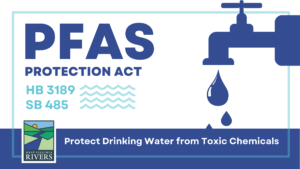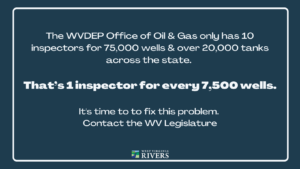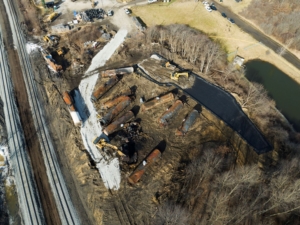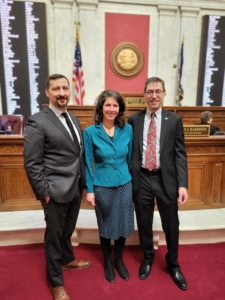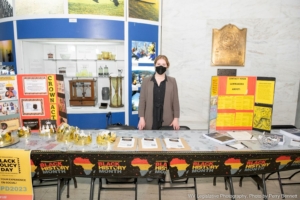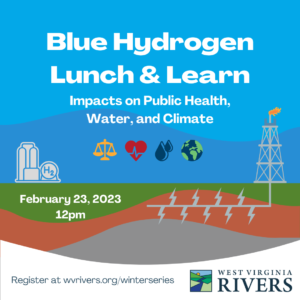Water Policy News: Fifth Update of the 2023 Session
House Judiciary to Consider PFAS Protection Act on Monday
An article in the Charleston Gazette-Mail this week led with, “West Virginia has a big PFAS problem.” We agree with this sobering news, check out our PFAS information packet and lists of communities across the state impacted by the PFAS problem. The good news is that the PFAS Protection Act (SB 485 / HB 3189) has moved through its first committees, with big thanks to your emails and calls to committee members. Now all eyes are on the House Judiciary Committee as HB 3189 is first on their Monday morning agenda.
Another bill relating to PFAS is on the move, HB 2860, which aims to ensure the safe disposal of AFFF fire-fighting foam. AFFF is a type of PFAS that when used in fire-fighting risks contaminating water supplies. Read more from the Gazette-Mail here. That bill passed its first committee this week and now goes to the House Government Organization Committee.
More good news for our communities impacted by PFAS is that there was an announcement this week about the availability of federal funds to help address PFAS in WV. Reporting here and here. The combination of the PFAS Protection Act and this federal funding will certainly help begin to tackle the drinking water problems on a lot of people’s minds these days.
Defending our Public Lands and Water
We are still keeping a close eye on the Senate Outdoor Recreation Committee, watching for a substitute for SB 468 that would open up public lands to off-road vehicle use. There was no action on that bill this week, but we are still providing input to committee members that we cannot support opening public lands to ATV/ORV use without public input and legislative approval. Contact the Committee and let them know your concerns about opening up our public lands to off-road vehicles.
This week was marked the deadline for new bills to be introduced. We’re pleased to report no bills were introduced in the House, as we’ve seen in recent years, to weaken drinking water protections in the Aboveground Storage Tank Act. But we know we have to stay vigilant as it’s common for such bills to originate in a committee (which sidesteps the conventional bill introduction process).
Bill to Fund More Oil & Gas Inspectors Weakened
While you’ve been helping us try to strengthen a funding bill for oil and gas industry oversight, the industry was successful in weakening it this week. On Monday, the House Finance Committee stripped out lower producing wells from having to pay an annual oversight fee from HB 3110, then brought it back on Wednesday to partially restore revenue from lower producing wells into the oversight program. Only companies that own over 500 of wells in the lower producing tier would be subject to the fee, up to 4000 wells. This results in DEP losing around $100,000 annually to support oil and gas inspectors.
Delegate Evan Hansen has filed a floor amendment to make improvements to the bill that is expected to be debated and voted upon on Monday. The amendment would lift caps on the amount of wells subject to annual oversight fees owned by any single company. The bill as introduced favors 4 companies – Antero, EQT, Diversified, and SWN – in getting a total of 3,430 wells exempted from paying an annual fee. These exemptions equate to $395,475 in lost revenue for oil and gas inspectors; with this money the state could support an additional 5 inspectors.
DEP currently only has 10 inspectors overseeing approximately 75,000 wells and over 20,000 tanks. Read our fact sheet.
HB 3110 redirects a small portion of the oil and gas severance tax to DEP and establish new fees that, together, are anticipated to support an additional 10 inspectors – which we say, still isn’t nearly enough! Even with that increase, we would be only at half the staffing that PA and OH support per well in their states. WV would need to staff around 40 inspectors to be in line with neighboring states’ oversight capacity. Please contact members of the House and ask them to fully fund DEP’s Office of Oil and Gas.
Drinking Water Concerns Elevated for West Virginians
Five million people drink from the Ohio River and many more from its tributaries. Two recent water contamination events underscore our reliance on the waters of the Ohio River Valley. The train derailment and resulting chemical contamination crisis in East Palestine, OH and the unknown contamination of drinking water in Fort Gay, WV are reminders to West Virginians that our waters are both vital and vulnerable.
WV Rivers will continue to advocate for strengthening regulations that safeguard our water resources, push for corporate accountability, and call on regulators to be transparent and forthcoming with critical information about the risks to public health and safety when disaster strikes.
We stand in solidarity with impacted residents of East Palestine and Fort Gay in our commitment to ensure that everyone has access to clean, safe water.
WV Rivers Meets with EPA Regional Administrator
Our executive director Angie Rosser helped set up meetings with the EPA Regional Administrator Adam Ortiz while he and members of his team were in Charleston last Friday. We provided a legislative update to EPA staff and joined other non-profit partners in reviewing various water issues.
“We appreciate Regional Administrator Ortiz taking time to meet with community members about issues of public concern,” said Angie Rosser. “It means a lot that he’s been spending time in West Virginia to better understand the unique environmental challenges we face.”
WV Rivers At Black Policy Day
WV Rivers’ climate campaign coordinator Morgan King, Ohio River coordinator Heather Sprouse, and staff scientist Jenna Dodson tabled and volunteered at Black Policy Day this past week. Staff were grateful to attend and increase support for shared legislative priorities. You can read more about the WV Black Voter Impact Initiative, the organizers of Black Policy Day, here.
Videos on PFAS in WV Drinking Water Supplies
Video: PFAS in Drinking Water Supplies
Looking for information on what PFAS are? Where they are found in our drinking water supplies? And what the PFAS Protection Act does? This is the webinar for you! This 30-minute webinar provides are great overview of PFAS in West Virginia.
Video: Eastern Panhandle PFAS Forum
In this 1 hour and 20 minute recording of a live meeting held at the Byrd Center in Shepherdstown on January 25, you’ll hear from expert panelists on the problem of PFAS in water supplies from a state and federal prospective.
Lunch & Learn Webinar on Blue Hydrogen
February 23 at 12:00pm: What is Blue Hydrogen? Before West Virginia volunteers to be the next “hydrogen hub,” we need to learn about what Blue Hydrogen is and its potential impacts to our communities. Register for the webinar.
Join us for E-Day!
Please come spend the day with WV Rivers staff and like-minded environmental advocates from around the state.
February 28: Environment Day at the Capitol. Read about the legislative priorities and register here.

